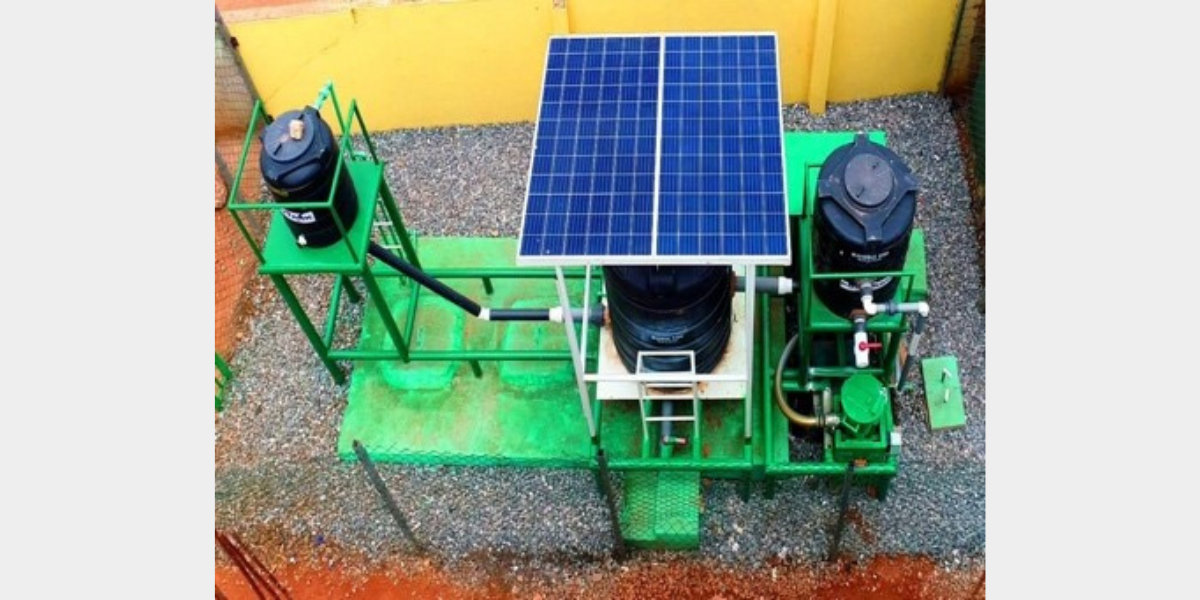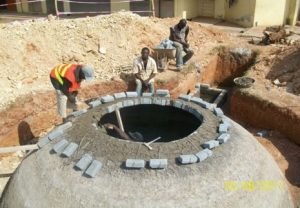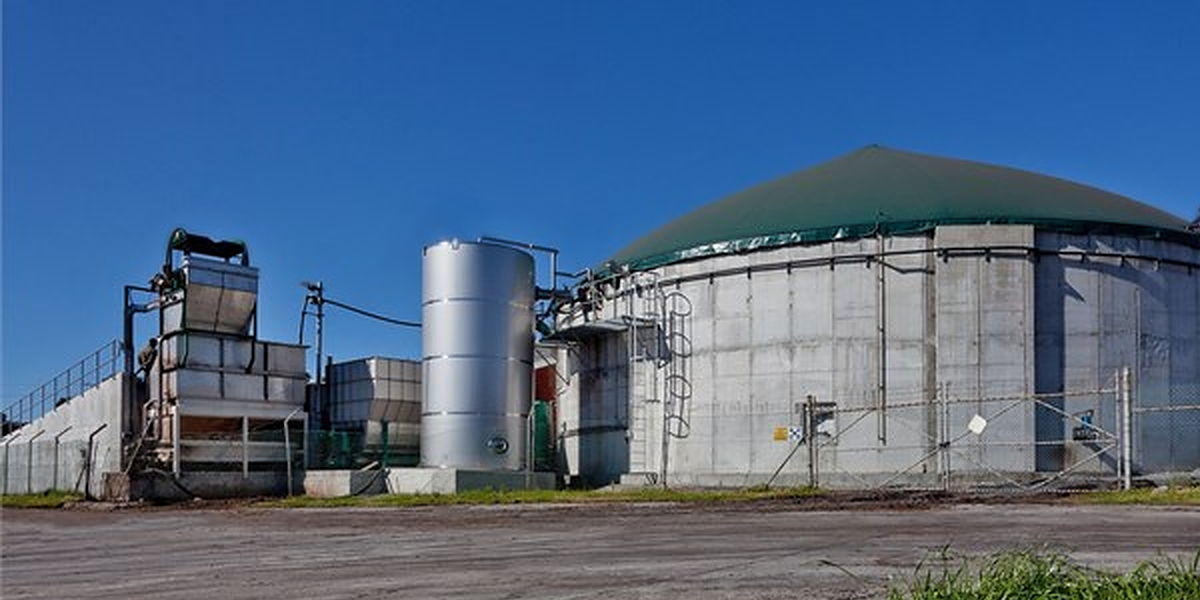
As the world waits for COP26, Dr Richard Bayitse considers how solving the global challenge of the climate crisis can build on local solutions to the energy needs of communities.


Sustainable energy is key to the development of a nation and reducing greenhouse gas emissions. If energy can be derived from local sources, and used locally, then the added benefits include poverty alleviation and provision of community energy security. Biogas is a sustainable energy source produced by digesting organic wastes or other biomass in an oxygen-free (anaerobic) tank, known as a biodigester. As well as biogas, the residue at the end of digestion can be used as a biofertilizer in crop production.
To sustain and expand the use of biogas, research into new biogas technologies focusing on design and use of local materials are vital. In the late 1960s, the government of Ghana showed interest in biogas technology, but the technology penetrated the country only slowly. The first large scale community-based biogas plant was commissioned only in 1992. Small-scale household and community-based biogas plants installed for sanitation purposes are dominant in Ghana.
The most common design of biodigester in Ghana is the fixed dome biodigester (FDBD) shaped like Ghanaian traditional drinking pot, as seen in the image on the left at the top of this blog. Although FDBDs are effective in digesting organic waste to generate biogas and biofertilizer, they are costly and need skilled workers for construction. Small burnt bricks are used for construction, which requires highly skilled labour which is sometimes difficult to come by. Furthermore, all FDBDs are buried underground, which makes it very difficult to identify and mend leakages when they occur. These challenges, among others, motivated scientists at the Institute of Industrial Research (CSIR-IIR), part of Ghana’s Council for Scientific and Industrial Research (CSIR) to research and develop alternative designs that are both highly effective in generating quality biogas and biofertilizer and easier to build and maintain than dome biodigesters. The development of new biodigester technologies has often been slow because of funding challenges but over the last decade CSIR-IIR has added three new designs to the traditional FDBD.
In 2014 CSIR-IIR designed and constructed a new biodigester- the Anaerobic Baffled Bio-Digester (ABBD)- which addressed the challenges of cost and constructional skills associated with FDBDs. ABBD design and construction resembles a conventional septic tank, for example using local materials like sandcrete blocks, cement and sand, it has all the features of a biodigester. There are baffles in the digester, as in the headline photo on top of this blog, which control the flow of digestate within the digester to enhance mixing of the substrate for optimum biogas production. This new design is very effective in both waste treatment and biogas generation. In 2019 Portable Anaerobic Baffled Bio-Digester (PABBD) was designed for small scale domestic effluent treatment and biogas production. This design is similar to ABBD but the only difference is that, the components of the digester are pre-fabricated in the form of concrete slabs and transported for installation on-site.
Most recently, in 2020, CSIR-IIR has designed and constructed an Integrated Biodigester (IBD). The development of the IBD has been supported by the ACTUATE project, funded by the GCRF-EPSRC Global Research Translation Award linked to the RECIRCULATE project, also funded by GCRF. We designed and constructed the IBD to resolve problems associated with FDBDs, both the costs of construction and identifying and repairing digester leaks. The whole IBD concept started with a brainstorming session of the ACTUATE team of scientists from Lancaster University and CSIR. From nothing more than a hand sketch of the digester system and a general scientific discussion of the digester system, we progressed to actual engineering design and then construction.
The initial project concept was to co-design, construct and install a pilot IBD system with the students of Umar Bun Hatab Islamic Basic School at Madina Zongo, a neighbourhood in Accra. The COVID-19 pandemic and the subsequent closing down of schools in Ghana inevitably constrained the participation of students, but we were determined that the pandemic would not to delay the construction and installation of the IBD at the school. To achieve that, scientists from CSIR-IIR, in collaboration with project partners from Lancaster, went ahead to construct and install the digester at the school, ensuring that we had carefully photographed the whole of the design, construction and installation process for future use by the school and its students.
The integrated biodigester is not only unique in the use of local materials but also designed to fit into a limited available space in the school. It uses two organic waste streams as feedstock: food waste from the homes of school children and faecal sludge from the school septic tank. The digester has two macerator pumps and a solar power system that generates electricity onsite to provide energy to pump waste from the school septic tank and the food waste mixing tank into the digester to produce biogas and biofertilizer. The school uses the biofertilizer to improve and “green” its environment, while the gas supplies what we call our “show lab” to demonstrate the use of biogas in cooking and lighting.
The IBD at Umar Bun Hatab Islamic Basic School at Madina Zongo has been operating since September 2021, so it is still early days. However, this is the latest step in CSIR-IIR’s involvement in the development of biogas systems that meets the needs of communities in Ghana. As I write this, the world is waiting for the COP26 climate summit, which should include finalizing a financial system to help low and medium income countries control their greenhouse gas emissions. I sincerely hope they agree. The questions then is how best to use those financial resources. Do we replicate the energy systems of the global north? Or do we develop new systems that really meet our needs in a country like Ghana? Between 1987 to 2021, working with our communities, CSIR-IIR built fifty four FDBDs, nineteen ABBDs, two PABBDs and now one IBD. Perhaps that points the way to how biodigesters, and researchers working closely with local communities, could contribute to both Ghana’s energy needs and the global need to control greenhouse gas emissions.
 |
Dr Richard Bayitse is a Senior Research Scientist with over 25 year of working experience and the former Head of Sanitation and Environmental Management Division of CSIR-Institute of Industrial Research. He specializes in Enzymatic hydrolysis and fermentation for ethanol and amino acids, biogas production, wastewater treatment and analysis, environmental quality analysis and management, enzymatic hydrolysis and fermentation process optimization, environmental characteristic mapping using unmanned aerial vehicles. He is a technical expert for Environmental Protection Agency (EPA) and Ghana Standard Authority (GSA) in Ghana and an expert Scientist for EU Commission. |
All articles in The FLOW are published under a Creative Commons — Attribution/No derivatives license, for details please read the RECIRCULATE re-publishing guidelines.




